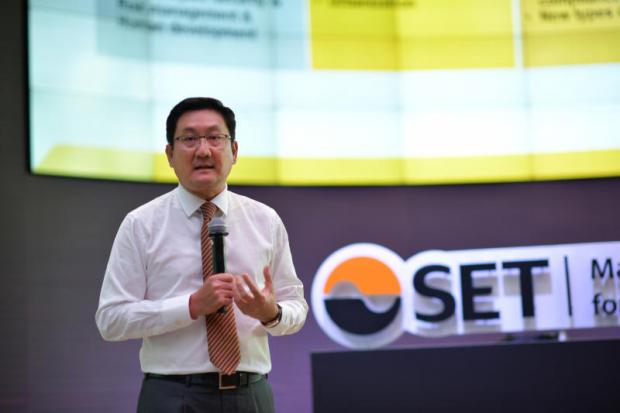
The Stock Exchange of Thailand (SET) plans to reduce repetitive work tasks in cooperation with the Securities and Exchange Commission (SEC) to speed up the process of fund-raising and stock listing.
Such measures will streamline work flow, and listed firms will have greater understanding of regulatory practices to abide by, SET president Pakorn Peetathawatchai told the Bangkok Post in an exclusive interview.
"I have started negotiating with SEC secretary-general Rapee Sucharitakul, and he agrees with the issue on finding a solution to solve work flow repetition in order to have long-term efficiency," Mr Pakorn said. "This is my first priority."
Mr Pakorn took the bourse's top job on June 1, becoming the SET's 13th president and replacing Kesara Manchusree. The SET president's term runs for four years.
The application process for the new SET president initially began on Dec 18 and ran until Jan 15, but the application deadline was extended to Jan 31 with no reason specified.
"The SET's internal working process needs to be solved," Mr Pakorn said. "We have found that each operation is separated, which has been obstructing the work flow process and impacting listed firms in terms of time and cost burden."
The SET and the SEC have to find a solution by setting up a standard practice for listed firms to follow in order to prevent any confusion from occurring, he said.
"We want the work process to be straightforward, so that there will not be any repetition or relapse," the president said. "For instance, we will not have to return to step two if there are three steps in the work process."
The listing process also needs a rethink in order for companies to evaluate the whole fund-raising procedure and assess market regulations after completion of an initial public offering, he said.
"In the future, listed firms can discuss [the listing process and requirements] solely with the SET, and the SEC should only endorse what the SET has discussed with listed companies," Mr Pakorn said. "This is my dream."
At present, listed firms have to hold discussions with both the SET and the SEC, while the listing process involves consideration by both organisations.
Once the SEC approves an IPO, the listing process moves on to the SET or the Market for Alternative Investment.
"Regulatory reform will take time, so it cannot be said when the process will finish," Mr Pakorn said. "But Mr Rapee agrees with the idea and we will have to initiate [further discussions] for future work efficiency.
"Our solution is not to solve the quantity problem, but rather the quality problem as well. In the future, the SET aims to encourage quality [investment] products and increase other products for both domestic and global assets such as infrastructure funds and real estate investment trusts.
"The SET will also upgrade more SET-listed firms to be listed on the Dow Jones Sustainability Index, so that the SET's development can be augmented in terms of quantity and quality."
For investors, the SET will support all types of investment incentives among every investor group and offer appropriate investment products to cater to each group, Mr Pakorn said.
Different investors vary in their investment objectives, such as short-term investment gains versus long-term investment value.
In the past, the SET had promoted an investment strategy called dollar cost averaging, an investment technique of buying a fixed amount of a particular investment on a regular schedule.
For the future, the bourse aims to promote a "life path" investment strategy to provide support for Thailand's ageing society.
The bourse also aims to incorporate big data for market analysis and investor behaviour inspection, Mr Pakorn said, citing how stock markets in Taiwan and South Korea, where retail investors dominate the markets, are using big data to improve their capital market strategies.
"As an emerging market, we still do not know a lot on what can be done to develop the market further, but big data can support us to learn from people's behaviour," he said. "The new trend of financial technology and new technological disruption have caused traditional capital markets to learn and find solutions in meeting the new challenges."
For initial coin offerings, Mr Pakorn did not mention whether the SET would initiate a trading benchmark for ICOs or digital assets, but he allowed that the bourse could increase the number of startups on Live, a trading platform for startups and small and medium-sized enterprises, as the nature of startups is similar to that of ICOs, and this would let investors diversify risk.